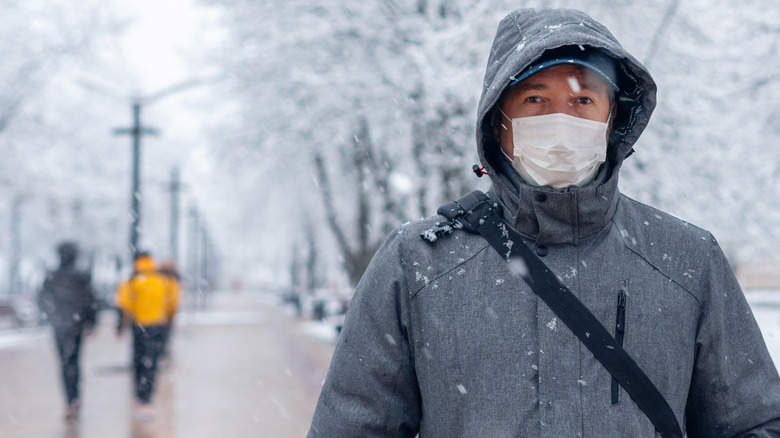Scientists Predict COVID-19 Will Become An Endemic Virus. Here's What That Means
The scientific study of viral diseases has existed since the 19th century (via Mandell, Douglas, and Bennett's Principles and Practice of Infectious Diseases). As a significant source of disease mortality rates across the globe, viral infections have changed the course of history throughout time and continue to do so. The COVID-19 virus is among those making history, as it continues to impact populations worldwide.
The spread of infectious diseases can go through different stages. According to Physiopedia, viral infections can be classified as endemic or present permanently in a region or population. They may then progress to an epidemic, in which the virus spreads quickly throughout multiple communities, often due to an agent mutation such as the flu. Lastly, when the spread of a virus is classified as a pandemic, it has spread over several continents, has infected large numbers of a population, has a high death toll, and often results in social unrest or economic loss within society.
Since the onset of the pandemic, we've seen the nature of COVID-19 shift and mutate, producing new infectious variants such as the Delta and Omicron variants. As experts continue to monitor the progression of the virus, scientists now believe that the virus may eventually shift into an endemic virus (via CNN).
How winter will impact COVID-19 seasonality
With the anticipation of a rise in COVID-19 cases during the end-of-the-year holiday season, scientists believe this demonstrates the potential for the virus to eventually downgrade from a pandemic to a seasonal endemic (via CNN). While the virus won't be completely eradicated, its presence in society will be similar to that of the flu, with peaks of cases occurring most likely during the winter season, as outlined in a recently published Nature Computational Science 2021 study that describes COVID-19 as a "seasonal low-temperature infection."
With over 120,000 new cases currently being reported daily in the United States, these numbers illustrate an increase in wintertime cases when compared to data reported during the summertime, according to CNN. Professor and former dean of the University of Pittsburgh Graduate School of Public Health Dr. Donald Burke elaborates, stating, "Our modeling of this suggests that the rhythm of the future epidemics will be seasonal, but that the amplitude may vary from year to year or time to time. There will always be this underlying seasonal rhythm, being with an extra half-beat in the South, but certainly the northern wave in the wintertime."
Dr. Burke goes on to say that this seasonality is unlikely to follow a finite pattern, stating that outside factors such as vaccination rates or the emergence of a new variant will impact the magnitude of the surge. Despite this, experts believe that the basic "ebb and flow" nature of the virus will eventually remain.


